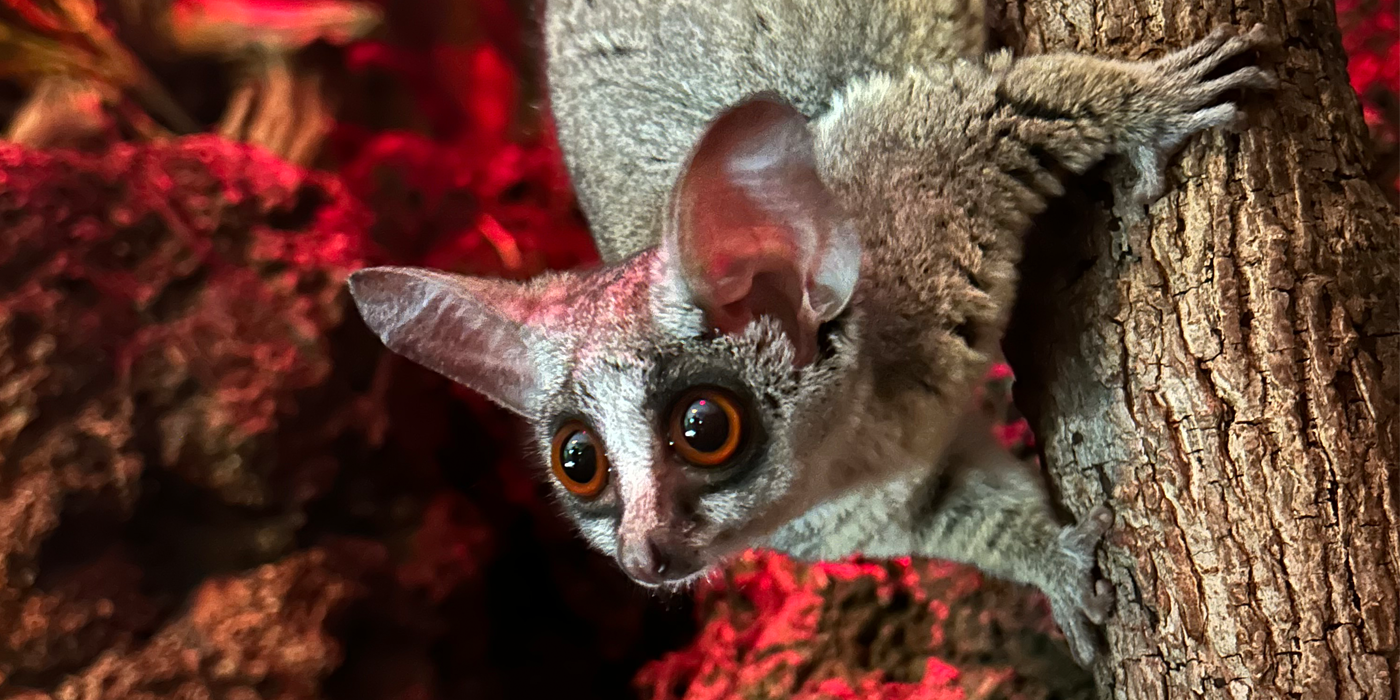Also called the Moholi bushbaby, southern lesser galagos are small, tree-dwelling members of the primate family that can be found throughout forested savannah areas of southern Africa. They rely on their huge eyes, strong hands and long tails to move quickly through the trees at nighttime.
Physical Description
Size
Southern lesser galagos are about the size of a large squirrel. Adults have a head and body length that is about 6 inches (15 centimeters) long. Their tail stretches up to one-and-a-half times as long as their body, at 9 inches (23 centimeters) long! Males tend to be a little bit bigger than females.
Native Habitat
Lifespan
Communication
These primates have a wide variety of vocalizations that they use to communicate with each other, including chirps, barks, clicks and hoots. They have a loud whistling call that they use to alert other galagos when danger is nearby.
Food/Eating Habits
Southern lesser galagos wake up at sunset to feed and eat sporadically through the night. Their diet is mostly made up of insects, such as butterflies, moths and beetles, as well as tree gum and fruit. They are particularly fond of the gum of acacia trees. They have rough, narrow tongues that allow them to harvest the gum more easily. This gum is hard to digest for most animals, but southern lesser galagos have a specialized digestive system that allows them to process it.
Sleep Habits
Southern lesser galagos sleep during the daytime and are active at night. Their big eyes give them excellent night vision, allowing them to navigate dense tree canopies with ease. During the daytime they often sleep with other galagos in nests made in tree hollows or cavities.
Social Structure
They live in pairs or in small family groups, although they forage for food independently. Dominant males have territory that overlaps with several different females, and they will defend this territory from other males. Like other galagos, male members of this species coat their hands and feet with their own urine to spread their scent throughout their territory as well as on the fur of other galagos in their social group.
Reproduction and Development
Southern lesser galagos are polygynous, meaning that a dominant male will often mate with several different females that live inside of his territory. Mating seasons occur twice per year, with females giving birth either in January and February or October and November. Females usually produce sets of twins, and are capable of giving birth twice in a year. They build leafy nests inside of tree hollows and cavities and keep their babies inside these nests. Males do not help raise the young.
Babies are born with their eyes open and are mobile after about 11 days. The mother will hide her babies in a tangle of vegetation while she forages for food. They are weaned after about 90 days and are ready to venture out on their own when they reach sexual maturity at 9 or 10 months old.
Conservation Efforts
Help this Species
Practice ecotourism by being an advocate for the environment when you’re on vacation. During your travels, support, visit or volunteer with organizations that protect wildlife. Shop smart too! Avoid buying products made from animals, which could support poaching and the illegal wildlife trade.
Choose your pets wisely, and do your research before bringing an animal home. Exotic animals don’t always make great pets. Many require special care and live for a long time. Tropical reptiles and small mammals are often traded internationally and may be victims of the illegal pet trade. Never release animals that have been kept as pets into the wild.
Support organizations like the Smithsonian’s National Zoo and Conservation Biology Institute that research better ways to protect and care for this animal and other endangered species. Consider donating your time, money or goods.
Share the story of this animal with others. Simply raising awareness about this species can contribute to its overall protection.
Try fundraising for conservation organizations in new and fun ways. You could donate your birthday to conservation, or host a bakesale to benefit wildlife!
Smithsonian's National Zoo and Conservation Biology Institute. (n.d.). Southern lesser galago. Retrieved January 11, 2026, from https://nationalzoo.si.edu/animals/southern-lesser-galago
Animal News



